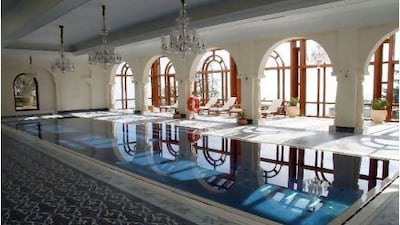In recent years, as tourism has boomed and middle-class Indians have increased business travel amid an accelerating economy, luxury hotel chains such as Canada's Fairmont Raffles and Thailand's Amari group have queued up in India to fill the growing shortage of hotel rooms.
The Federation of Indian Chambers of Commerce and Industry estimated in January last year the country needed an investment of 600 billion rupees (Dh49.63bn) over the next five years to meet the shortage of 150,000 hotel rooms.
But the demand for budget hotels offering spartan accommodation and value-for-money services to frugal travellers without the usual frills - no limo taxis, no bell boys, and no VIP treatment - is rapidly outpacing that for high-end hotels that dominate the sector.
The hotel consultancy HVS Global Hospitality Services says about 100,000 hotel rooms are expected to be added during the next four years in India, more than half of them in the budget and mid-market category.
One in every five hotel rooms constructed in the January-March quarter this year were in the budget category, says Lodging Econometrics, a research company based in the US.
A realisation is dawning that in order to cater to the general population in this nation of 1.21 billion people, "you cannot be an elitist industry" and ignore the growing "middle market", says PR Srinivas, the India head for tourism and hospitality at Deloitte.
India is one of the world's fastest-growing tourism markets. The travel and tourism competitiveness report 2011 by the World Economic Forum ranks India as the 12th most attractive destination for tourists in the Asia Pacific region. Foreign tourist arrivals totalled 507,000 in March this year compared with 472,000 during the same month last year. Foreign exchange earnings from tourism stood at US$1.22 billion (Dh4.48bn) in March this year compared with $1.2bn in the same month last year.
A total of 18 million foreign tourists visited India last year compared with 14.4 million in 2009, while domestic tourism grew to 740 million last year compared with 669 million in the previous year.
The hotel room market for the 10 largest Indian metros is expected to expand at a compounded annual growth rate of 17 per cent to $2.66bn by the end of 2013. But the astronomically high price of land and poor infrastructure that raises construction costs is hurting profit margins.
Several hotel chains have been reeling under mounting debt since the global economic downturn. The terrorist attacks on two luxury hotels in Mumbai in 2008 made matters worse.
Occupancy rates have improved since then, although still not to pre-2008 levels. The brokerage firm Sharekhan says occupancy rates in metro cities stood at 70 per cent to 75 per cent in the January-March quarter compared with about 80 per cent in the same quarter in 2008. Roots Corporation, a subsidiary of the Tata group's Indian Hotels Company, which operates the budget hotel chain Ginger, recently approved the sale of a minority stake to raise 2.5bn rupees.
East India Hotels, a hospitality major that operates the Oberoi group of hotels, sold a 14.2 per cent stake to Reliance Industries for 10.21bn rupees.
The company intends to use the money to help pay off its outstanding debt of 15.5bn rupees by the end of this year.
High interest rates - which have been raised 10 times since March last year by the central bank to quell increasing inflation - and looming fears of a slowdown in the property sector have made it difficult to raise capital through India's banks. "Interest rates in India are among the highest in the world," says Manav Thadani, the managing director of HVS Global Hospitality. "That is making life difficult for some hotel projects currently under way."
Many budget hotels have added concierge desks and cafes to their properties because of growing demand from guests, raising costs.
Private-equity firms are cautious about investing in the hotel industry, traditionally seen as long-term holdings that can take several years to break even.
The US industry consultancy Lodging Econometrics says, that because of difficulty in raising capital, 52 hotel projects have been put on hold or cancelled since last year.

